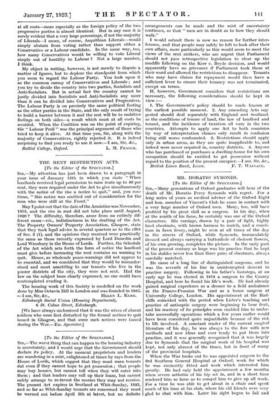[To the Editor of the SPECTATOR.]
SIR,—The worst thing that can happen to the housing industry is uncertainty, and I would urge that the Government should declare its policy. At the moment proprietors and lenders tire wandering in a mist, enlightened at times by rays from the House of Lords, which suggest that they must warn tenants dut even if they cannot hope to get possession ; that people may buy houses, but cannot tell when they will enter into them ; and that lenders may call up their loans, but cannot safely arrange to re-invest the monies they may not receive. The present Act expires in Scotland at Whit-Sunday, 1923, and so far as Whit-Sunday tenants are concerned they must be warned out before April 5th at latest, but no definite
arrangements can be made and the mist of uncertainty continues, so that " men are in doubt as to how they should walk."
I would submit there is now no reason for further inter- ference, and that people may safely be left to look after their own affairs, more particularly as this would seem to meet the views of the rent strikers, who are urgent that Parliament should not pass retrospective legislation to clear up the muddle following on the Kerr v. Bryde decision, and would apparently have no grievance if Parliament took them at their word and allowed the restrictions to disappear. Tenants who may have claims for repayment would then have a sufficient lever to ensure their tenancy was not terminated, except on terms.
If, however, Government considers that restrictions are necessary, the following considerations should be kept in view :-
1. The Government's policy should be made known at the earliest possible moment. 2. Any amending Acts sug- gested should deal separately with England and Scotland; as the conditions of tenure of land, the law of landlord and tenant, and the incidence of taxation all vary in the two countries. Attempts to apply one Act to both countries by way of interpretation clauses only result in confusion being still worse confounded. 8. Restrictions should apply only in urban areas, as they are quite inapplicable to, and indeed were never required in, country districts. 4. Anyone who has purchased or purchases a dwelling-house for his own occupation should be entitled to get possession without regard to the position of the present occupier.—I am, Sir, &c.,










































 Previous page
Previous page